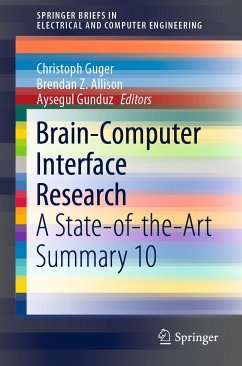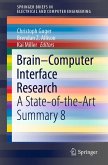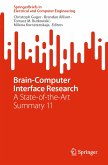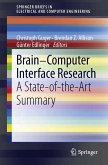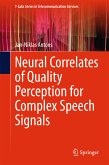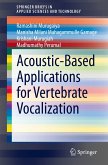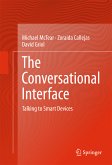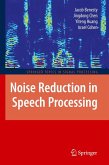Brain-Computer Interface Research (eBook, PDF)
A State-of-the-Art Summary 10
Redaktion: Guger, Christoph; Gunduz, Aysegul; Allison, Brendan Z.
53,95 €
53,95 €
inkl. MwSt.
Sofort per Download lieferbar

27 °P sammeln
53,95 €
Als Download kaufen

53,95 €
inkl. MwSt.
Sofort per Download lieferbar

27 °P sammeln
Jetzt verschenken
Alle Infos zum eBook verschenken
53,95 €
inkl. MwSt.
Sofort per Download lieferbar
Alle Infos zum eBook verschenken

27 °P sammeln
Brain-Computer Interface Research (eBook, PDF)
A State-of-the-Art Summary 10
Redaktion: Guger, Christoph; Gunduz, Aysegul; Allison, Brendan Z.
- Format: PDF
- Merkliste
- Auf die Merkliste
- Bewerten Bewerten
- Teilen
- Produkt teilen
- Produkterinnerung
- Produkterinnerung

Bitte loggen Sie sich zunächst in Ihr Kundenkonto ein oder registrieren Sie sich bei
bücher.de, um das eBook-Abo tolino select nutzen zu können.
Hier können Sie sich einloggen
Hier können Sie sich einloggen
Sie sind bereits eingeloggt. Klicken Sie auf 2. tolino select Abo, um fortzufahren.

Bitte loggen Sie sich zunächst in Ihr Kundenkonto ein oder registrieren Sie sich bei bücher.de, um das eBook-Abo tolino select nutzen zu können.
- Geräte: PC
- ohne Kopierschutz
- eBook Hilfe
- Größe: 3.63MB
Andere Kunden interessierten sich auch für
![Brain-Computer Interface Research (eBook, PDF) Brain-Computer Interface Research (eBook, PDF)]() Brain-Computer Interface Research (eBook, PDF)40,95 €
Brain-Computer Interface Research (eBook, PDF)40,95 €![Brain-Computer Interface Research (eBook, PDF) Brain-Computer Interface Research (eBook, PDF)]() Brain-Computer Interface Research (eBook, PDF)36,95 €
Brain-Computer Interface Research (eBook, PDF)36,95 €![Brain-Computer Interface Research (eBook, PDF) Brain-Computer Interface Research (eBook, PDF)]() Brain-Computer Interface Research (eBook, PDF)40,95 €
Brain-Computer Interface Research (eBook, PDF)40,95 €![Neural Correlates of Quality Perception for Complex Speech Signals (eBook, PDF) Neural Correlates of Quality Perception for Complex Speech Signals (eBook, PDF)]() Jan-Niklas AntonsNeural Correlates of Quality Perception for Complex Speech Signals (eBook, PDF)73,95 €
Jan-Niklas AntonsNeural Correlates of Quality Perception for Complex Speech Signals (eBook, PDF)73,95 €![Acoustic-Based Applications for Vertebrate Vocalization (eBook, PDF) Acoustic-Based Applications for Vertebrate Vocalization (eBook, PDF)]() Ramashini MurugaiyaAcoustic-Based Applications for Vertebrate Vocalization (eBook, PDF)48,95 €
Ramashini MurugaiyaAcoustic-Based Applications for Vertebrate Vocalization (eBook, PDF)48,95 €![The Conversational Interface (eBook, PDF) The Conversational Interface (eBook, PDF)]() Michael MctearThe Conversational Interface (eBook, PDF)97,95 €
Michael MctearThe Conversational Interface (eBook, PDF)97,95 €![Noise Reduction in Speech Processing (eBook, PDF) Noise Reduction in Speech Processing (eBook, PDF)]() Jacob BenestyNoise Reduction in Speech Processing (eBook, PDF)73,95 €
Jacob BenestyNoise Reduction in Speech Processing (eBook, PDF)73,95 €-
-
-
Produktdetails
- Verlag: Springer International Publishing
- Seitenzahl: 125
- Erscheinungstermin: 28. August 2021
- Englisch
- ISBN-13: 9783030792879
- Artikelnr.: 62510559
Dieser Download kann aus rechtlichen Gründen nur mit Rechnungsadresse in A, B, BG, CY, CZ, D, DK, EW, E, FIN, F, GR, HR, H, IRL, I, LT, L, LR, M, NL, PL, P, R, S, SLO, SK ausgeliefert werden.
- Herstellerkennzeichnung Die Herstellerinformationen sind derzeit nicht verfügbar.
Christoph Guger is running g.tec medical engineering in order to design brain-computer interfaces systems. Brendan Allison is carrying out BCI research with P300 and motor imagery BCIs. Ayse Gündüz is running a BCI lab at University of Florida and performs direct brain stimulation and ECoG BCI research.
1 Enhancing gesture decoding performance using signals from human posterior parietal cortex.- Machine translation of cortical activity to text.- 2 Towards practical MEG-BCI with optically pumped magnetometers.- 3 EEG decoding of pain perception for a real-time reflex system in prostheses.- 4 A computer-brain interface that restores lost extremities touch and movement sensations.- 5 Restoring the sense of touch using a sensorimotor demultiplexing neural interface.- 6 A brain-spine interface complements deep-brain stimulation to both alleviate gait and balance deficits and increase alertness in a primate model of Parkinson's disease.- 7 Speaker-independent auditory attention decoding without access to clean speech sources.- 8 A high-performance handwriting BCI.- 9 A neuromorphic brain computer interface for real-time detection of a new biomarker for epilepsy surgery.- 10 "Sono-optogenetics": An ultrasound-mediated non-invasive optogenetic brain-computer interface.- 11 High-dimensional (8D) control of complex effectors such as an exoskeleton by a tetraplegic subject using chronic ECoG recordings using stable and robust over time adaptive direct neural decoder.
1 Enhancing gesture decoding performance using signals from human posterior parietal cortex.- Machine translation of cortical activity to text.- 2 Towards practical MEG-BCI with optically pumped magnetometers.- 3 EEG decoding of pain perception for a real-time reflex system in prostheses.- 4 A computer-brain interface that restores lost extremities touch and movement sensations.- 5 Restoring the sense of touch using a sensorimotor demultiplexing neural interface.- 6 A brain-spine interface complements deep-brain stimulation to both alleviate gait and balance deficits and increase alertness in a primate model of Parkinson's disease.- 7 Speaker-independent auditory attention decoding without access to clean speech sources.- 8 A high-performance handwriting BCI.- 9 A neuromorphic brain computer interface for real-time detection of a new biomarker for epilepsy surgery.- 10 "Sono-optogenetics": An ultrasound-mediated non-invasive optogenetic brain-computer interface.- 11 High-dimensional (8D) control of complex effectors such as an exoskeleton by a tetraplegic subject using chronic ECoG recordings using stable and robust over time adaptive direct neural decoder.
